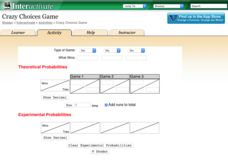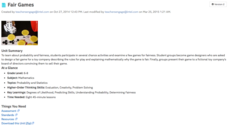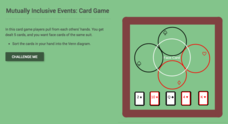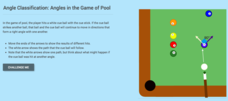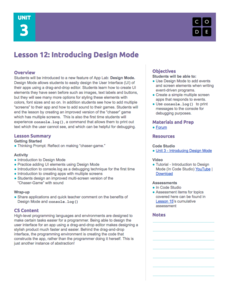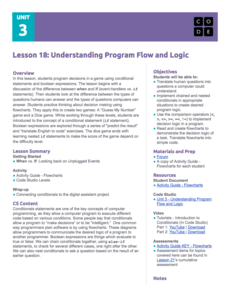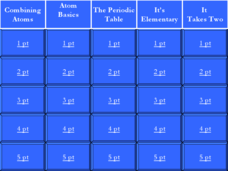CK-12 Foundation
Sums of Integers with Different Signs: Board Game
Five questions challenge scholars to show what they know about integers. Using an interactive board game, learners move pieces to discover where a player landed, then answer problems involving both positive and negative integers.
Shodor Education Foundation
Simple Maze Game
Avoid the mines and win the game! Young scholars direct a robot through a minefield by plotting points. Their goal is to reach the target in as few moves as possible.
Curated OER
Stabilization Wedges Game
Teamwork and critical thinking combine to for a creative lesson on reducing greenhouse gas emissions. Ebullient environmental studies learners play a game in which they strategize how to place colorful energy wedges together to create a...
Code.org
Star Wars: Building a Galaxy with Code
Welcome to the code side. The interactive lesson introduces coding in a game format with familiar characters. Young computer experts learn to develop code to control the interaction of the characters in the game. The activity ends with...
Shodor Education Foundation
Crazy Choices Game
Wanna take a chance on which game is best? The resource provides three games of chance using multiple types of games. Games range from coin toss to cards. Choosing a type of game, pupils determine what wins and enter the theoretical...
Intel
Fair Games
Who said things were fair? The unit introduces probability and its connection to fairness. The class interacts with activities of chance and plays games to relate them to fairness. Groups design a fair game and develop a presentation....
CK-12 Foundation
Expected Value: Game of Chance
Determine whether the payoff is worth it. Pupils calculate the expected value of a game with three different payoff levels. Each level has a different probability of winning money. The scholars find the expected payoffs for each...
CK-12 Foundation
Mutually Inclusive Events: Card Game
Find probabilities of pulling cards. Using a Venn diagram, individuals sort five cards along the rules of a game. The pupils calculate compound probabilities using the information from the diagram. Initially, the interactive provides the...
CK-12 Foundation
Angle Classification: Angles in the Game of Pool
Make a game of angle classification. Using the direction of the pool ball, scholars determine the measure of the created angles. They work to create and classify different types of angles throughout an engaging interactive.
Curated OER
Equivalent Fraction Dice Game
Young scholars play a fraction dice game to familiarize themselves with equivalent fractions. In this fraction lesson, students work with a partner to play the game and young scholars write a reflection to conclude the...
Code.org
Introducing Design Mode
Move beyond buttons when designing user interfaces. In the fourth installment of a 21-part unit, young computer scientists learn to apply design mode, which gives users options for colors, fonts, etc. They learn to incorporate these...
Code.org
Beyond Buttons Towards Apps
Explore how people use event-driven programming in games with a lesson plan that teaches scholars to use new screen elements and events. They apply these new elements to create a simple chaser game.
Shodor Education Foundation
Algebra Four
Everybody wins when you play Algebra Four. Players solve linear and quadratic equations to earn pieces on the Algebra Four game. Make a row of four pieces and you win the game. But everyone gets practice with solving equations, so really...
Curated OER
Leftovers
Math games build and enforce division skills in a fun environment. The students play a game in which tiles are divided by the number rolled on a die and "leftovers" are kept by the first player. In each turn, the players record division...
Code.org
Understanding Program Flow and Logic
Explore decision-making logic in programming computer games. The 10th installment of a 21-part unit teaches scholars how to apply conditional statements and Boolean expressions. They use these concepts to create a "Guess My Number" game...
Shodor Education Foundation
Life
How does life evolve? The interactive provides a simulation based on the Game of Life invented by mathematician John Conway. Users can run the applet with the preset rules and settings or adjust them to view whether overpopulation or...
California Academy of Science
Natural Resources Bingo
Bingo isn't just a silly game, it's a great way to practice all types of skills. After reviewing that the earth is composed of natural resources, what those natural resources are, and sustainability, the class plays a game of bingo. The...
CK-12 Foundation
Discrete Random Variables: Roll the Dice!
And the winner is ... not always who it appears to be. An interactive gives the directions for a dice game that on the surface gives one player an advantage over the other. Pupils look closer at the possible outcomes and find the...
CK-12 Foundation
Numbers with Decimal Place Value: Battleship Decimals
Decimal place value is the topic of a Battleship themed-interactive. Scholars answer five questions—multiple-choice and true or false—while referencing a grid that acts as the board game. The practice concludes with a discussion...
Code.org
Events Unplugged
Introduce event-driven programming. Young computer scientists learn the meaning of event-driven programming and how it is different from previous styles of programming. They play a card game to simulate the challenges that occur in this...
Curated OER
Go Bug!
Second graders explore the lives of insects by participating in a card game. In this metamorphosis lesson, 2nd graders define several scientific vocabulary terms associated with insects and identify the different life cycles associated...
Curated OER
Jeopardy
Students participate in games to review subject matter. They drill on vocabulary and/or spelling words. Students connect pertinent facts with dates. They perform activities as a group review before a test.
Shodor Education Foundation
Racing Game with One Die
Pupils roll a die to figure out which car advances on a race track. They determine the rules for each car moving forward and, given the statistics of the winner, compare if it matches their predictions.
Shodor Education Foundation
Simple Coordinates Game
Let coordinate pairs show you the way home. Scholars plot houses on a coordinate plane with given coordinates using an interactive app. Alternatively, they can identify the coordinates of houses already plotted on a coordinate plane.




